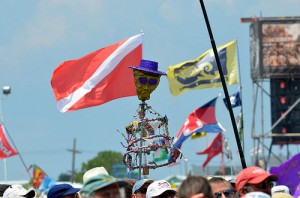Jan Ramsey kicked a hornets’ nest when she raised the issue of accessibility at Jazz Fest for those with disabilities. The conversation that followed in the comments on her post is lengthy, rambling and contentious, but there’s a near-universal sense that the festival ought to do better by festgoers who need help getting around. They’re right, but I wonder if the conversation would be the same if Jazz Fest hadn’t courted the aging baby-boomer audience for so many years. Do older Bonnaroo, Austin City Limits, Coachella and Voodoo fans expect to be similarly accommodated, or will they?
Still, those who think Jazz Fest jumped the shark have a point. In a series of incremental steps, it has lost sight of what was once most meaningful to festgoers—the sense of community. When it was a much smaller and younger festival, there was a good chance that most of the attendees shared values, enthusiasms and cultural beliefs. Jazz Fest was a gathering of the tribe, but as it became bigger and brought in more commercial acts, that feeling of unity was fractured.
Many who love roots music do so because they see it as the antithesis of the acts that now define the biggest stages, and you can see that tension play out on message boards, comment streams and Twitter feeds between Jazz Fest traditionalists and those drawn by the big name acts. This year’s headliners were about as sympathetic to Jazz Fest’s core sensibility as could have been booked, but the feeling of audience unity is further splintered by the various VIP packages, which create a class system at a festival that once celebrated music at its most democratic.
If this process isn’t inevitable, it’s hard to fight. Saying no to growth, expansion and greater significance takes a remarkably strong sense of purpose. Add to that the way New Orleans relies on Jazz Fest as an economic engine, and it’s clear that wagging a finger at Festival Productions is a simplistic response to complicated issues. Besides, last summer, one of our interns lodged a similar complaint about Bonnaroo and how it had morphed from a jam-band retreat to a festival that includes rappers and electronica artists.
Jazz Fest has done its part to create much of the discontent that accompanied a generally strong festival, but people also need to reconsider their own expectations and desires. Which ones are realistic and missteps on the festival’s part, and which ones reflect a desire for days that are gone for good? We’re in uncharted territory here as the first generations not to put down their music when they became adults enter their rickety years.





